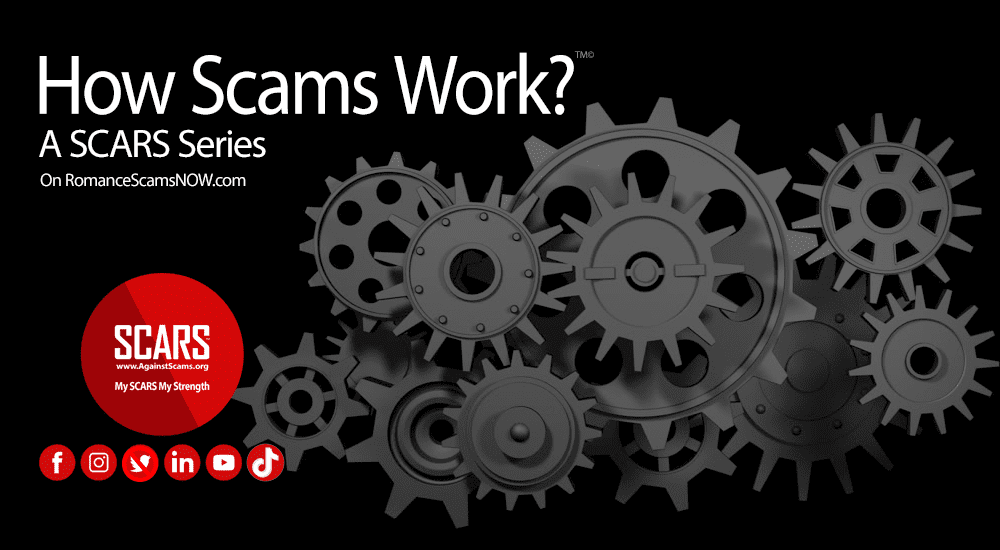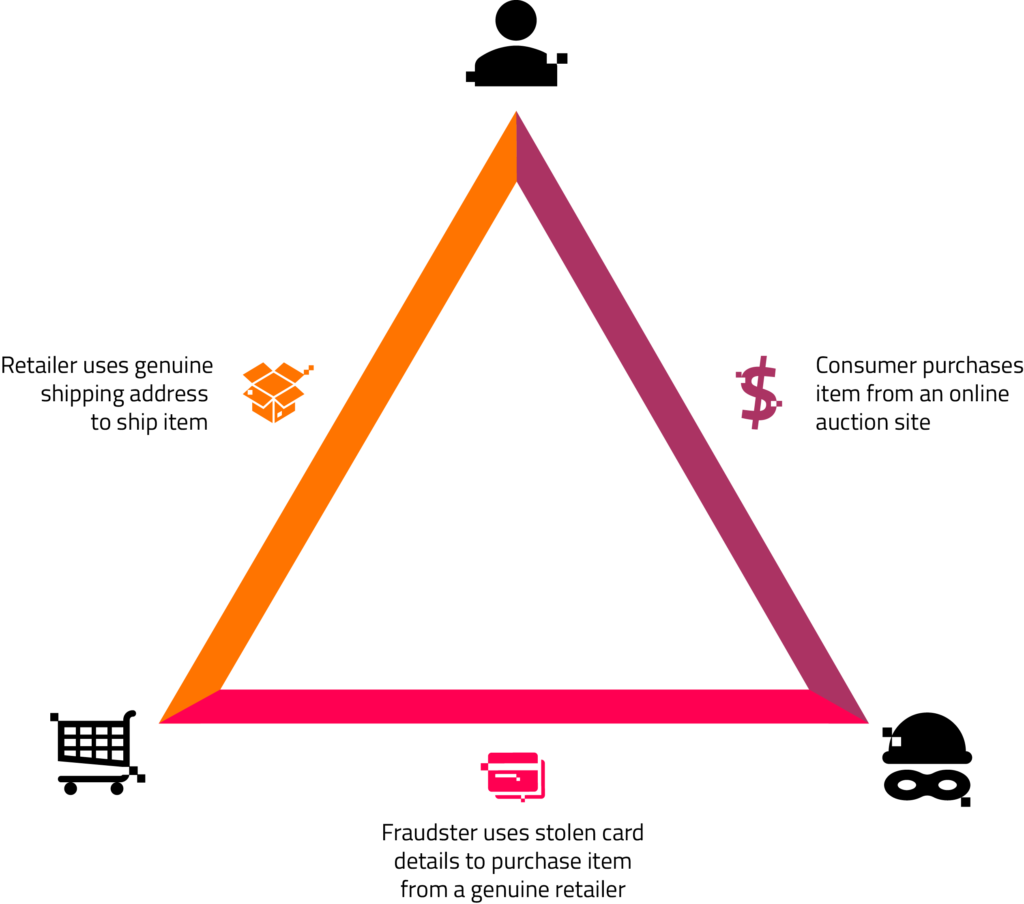Triangulation Fraud – Also Known As Three-way Fraud Or Drop Shipping Fraud, Is A Type Of E-commerce Fraud That Involves Three Parties: A Real Merchant, A Fake Merchant, And A Customer
What is Triangulation Fraud and How does it Work?
The Triangulation fraudster, who is the fake merchant, creates a fake online store and advertises it to potential customers. The store may sell a variety of products, but it is often focused on high-priced items such as electronics, designer clothes, or luxury goods.
When a customer orders a product from the fake online store, the triangulation fraudster purchases the product from the real merchant using a stolen credit card or another fraudulent payment method. The fraudster then ships the product to the customer directly.
The customer receives the product and is satisfied with their purchase, unaware that they have been the victim of fraud. The real merchant ships the product to the customer, but they never receive payment from the fraudster.
The fraudster makes money by selling the product to the customer for more than they paid for it or even the same – since they didn’t really pay for it, what they make is 100% profit. The real merchant loses money because they ship the product but never receive payment. The customer is also at risk, as their personal information may have been stolen by the fraudster.
Triangulation fraud is a difficult type of fraud to detect because it involves three parties, two of whom are unaware of the fraud. However, there are a few things that consumers and merchants can do to protect themselves from triangulation fraud.
How to Identify that a Customer is Part of a Triangulation Fraud Scheme
There are a few things that merchants can look for to identify customers who may be part of a triangulation fraud scheme:
- Customers who place large orders for high-priced items. Fraudsters often target high-priced items because they can make a larger profit on them. Also, since they are using stolen credit cards they may only be able to make one or two purchases before detection.
- Customers who use a different shipping address than their billing address. Fraudsters often ship the products to a different address than the billing address because they are using stolen credit cards.
- Customers who use multiple credit cards to make a purchase. Fraudsters may use multiple credit cards to avoid being flagged by fraud detection systems. Sometimes the triangulation fraudster will make multiple orders with different shipping addresses and different payment choices, to rush the merchant and get all the profit possible before detection.
- Customers who are new to your store and have no purchase history. Fraudsters often create new accounts to avoid being flagged by fraud detection systems. Merchants should always beware of new customers who do anything unusual.
- Customers who ask you to ship the product to a different address than the billing address, even if you have a policy against it. They may say that the purchase is a gift.
- New merchants/online retailers need to be especially cautious. New merchants typically have far less experience in fraud detection and do not have the technology in place to detect this type of e-commerce fraud.
If you see any of these red flags, you should be suspicious of the customer and may want to cancel the order. Merchants should never be afraid of canceling orders, since reliance on their fraud prevention rules will make them more money anyway.
How Merchants can Identify that are being used by a Triangulation Fraud Scheme
Merchants can identify that they are being used by a triangulation fraudster by looking for the following:
- A sudden increase in sales, especially for high-priced items.
- A large number of orders from new customers with no purchase history.
- A large number of orders with different shipping addresses than billing addresses.
- A large number of orders are paid for with multiple credit cards.
- A large number of orders are canceled or returned.
If you see any of these red flags, you should be suspicious that you may be the victim of triangulation fraud. You should contact the credit card companies involved in the disputed transactions and report the fraud to the authorities.
What Law Enforcement can do?
Law enforcement can help to combat triangulation fraud by investigating and prosecuting fraudsters, specifically the mule addresses and parcel mules. They can also work with merchants and consumers to educate them about triangulation fraud and how to protect themselves from it.
Law enforcement can also work with other countries to combat triangulation fraud, as it often involves international transactions.
How to Protect Yourself from Triangulation Fraud
Consumers and merchants can protect themselves from triangulation fraud by following these tips:
Consumers:
- Be wary of online stores that are offering high-priced items for significantly less than the market price.
- Do some research on the online store before making a purchase. Look for reviews from other customers and make sure that the store has a legitimate contact address and phone number.
- Use a credit card when making online purchases. Credit cards offer more fraud protection than debit cards.
- Be careful about what information you share with online stores. Only provide the information that is necessary to complete your purchase.
- Always look at who sent any pages you receive. If it comes from a different company name than who you placed an order with then this is a major red flag.
Merchants:
- Implement fraud detection systems to identify and flag suspicious orders.
- Be wary of orders for high-priced items, especially from new customers with no purchase history.
- Be wary of orders with different shipping addresses than billing addresses.
- Be wary of orders that are paid for with multiple credit cards.
- Contact the credit card companies involved in disputed transactions to report the fraud.
- Make it easy for apparently non-customers to contact you about orders they received. Most larger merchants make this very hard if not impossible.
- Establish a fraud reporting hotline!
By following these tips, consumers and merchants can help to protect themselves from triangulation fraud.
How to Report Triangulation Fraud
Consumers should report their suspicions to the merchant that shipped the product first to see if anything is wrong. DO NOT REPORT it to the merchant they purchased from, this just alerts the criminals.
If you think the merchandise was part of a fraud scheme, contact your credit/payment card provider immediately. Ask them to cancel the card number and do a chargeback. Real merchants will fight a chargeback, but fraudsters typically will not.
Do not do anything with the merchandise. Do not use it, keep it in the original box. It might be stolen property.
Contact your local police and explain what you suspect. Ask for an incident or report number, this is your proof of reporting and declaring your innocence.
You should also report the triangulation fraud to the FTC – see reporting.AgainstScams.org for details.
Summary
Triangulation fraud is a serious and growing threat to us all. Even if we are not involved in one of these schemes we pay for in through increased prices. Only the scammers win!
It is vital that every crime be reported. Scams and fraud got to be as large as they have in part because so few people report them.
Make sure you talk to your family and friends about triangulation fraud, especially teens and young adults. They are most often the victims without even knowing it. They have much less awareness of deception and are more tolerant of unusual practices.
More:
- Mule Addresses (scamsnow.com)
- Mule Address – Scam Basics (romancescamsnow.com)
- Parcel Mules And Reshipping Scams (romancescamsnow.com)
- What Is Triangulation Fraud ? – How Does It Work? | SEON
- What is Triangulation Fraud – Risks & Prevention – DataDome
- What is Triangulation Fraud and Why is Ecommerce at Risk? – Featurespace
- Block Inc. (SQUARE) Engaged In “Frictionless” Fraud Facilitation – Per A Hindenburg Research Report (romancescamsnow.com)
SCARS Resources:
- Getting Started Right: ScamVictimsSupport.org
- For New Victims of Relationship Scams newvictim.AgainstScams.org
- Subscribe to SCARS Newsletter newsletter.againstscams.org
- Sign up for SCARS professional support & recovery groups, visit support.AgainstScams.org
- Join our Scam Survivors United Chat & Discussion Group facebook.com/groups/scam.survivors.united
- Find competent trauma counselors or therapists, visit counseling.AgainstScams.org
- Become a SCARS Member and get free counseling benefits, visit membership.AgainstScams.org
- Report each and every crime, learn how to at reporting.AgainstScams.org
- Learn more about Scams & Scammers at RomanceScamsNOW.com and ScamsNOW.com
- Scammer photos ScammerPhotos.com
- SCARS Videos youtube.AgainstScams.org
- Self-Help Books for Scam Victims are at shop.AgainstScams.org
- Donate to SCARS and help us help others at donate.AgainstScams.org
- Worldwide Crisis Hotlines: https://blog.opencounseling.com/suicide-hotlines/
Other Cyber Resources
- Block Scam Domains: Quad9.net
- Global Cyber Alliance ACT Cybersecurity Tool Website: Actionable Cybersecurity Tools (ACT) (globalcyberalliance.org) https://act.globalcyberalliance.org/index.php/Actionable_Cybersecurity_Tools_(ACT)_-_Simplified_Cybersecurity_Protection
-/ 30 /-
What do you think about this?
Please share your thoughts in a comment below!
Do You Need Support?
Get It Now!
SCARS provides the leading Support & Recovery program for relationship scam victims – completely FREE!
Our managed peer support groups allow victims to talk to other survivors and recover in the most experienced environment possible, for as long as they need. Recovery takes as long as it takes – we put no limits on our support!
SCARS is the most trusted support & education provider in the world. Our team is certified in trauma-informed care, grief counseling, and so much more!
To apply to join our groups visit support.AgainstScams.org
We also offer separate support groups for family & friends too.
Become a
SCARS STAR™ Member
SCARS offers memberships in our STAR program, which includes many benefits for a very low annual membership fee!
SCARS STAR Membership benefits include:
- FREE Counseling or Therapy Benefit from our partner BetterHelp.com
- Exclusive members-only content & publications
- Discounts on SCARS Self-Help Books Save
- And more!
To learn more about the SCARS STAR Membership visit membership.AgainstScams.org
To become a SCARS STAR Member right now visit join.AgainstScams.org
To Learn More Also Look At Our Article Catalogs
Scam & Crime Types
More SCARS
- ScamsNOW Magazine – ScamsNOW.com
- ContraEstafas.org
- ScammerPhotos.com
- AnyScam.com – reporting
- AgainstScams.org – SCARS Corporate Website
- SCARS YouTube Video Channel












![An Example of How Scammers Use Emergency Scams - 2014 [UPDATED 2024] - on SCARS RomanceScamsNOW.com](https://romancescamsnow.com/wp-content/uploads/2014/06/emergency-scams.png)

Please Leave A Comment - Tell Us What You Think About This!